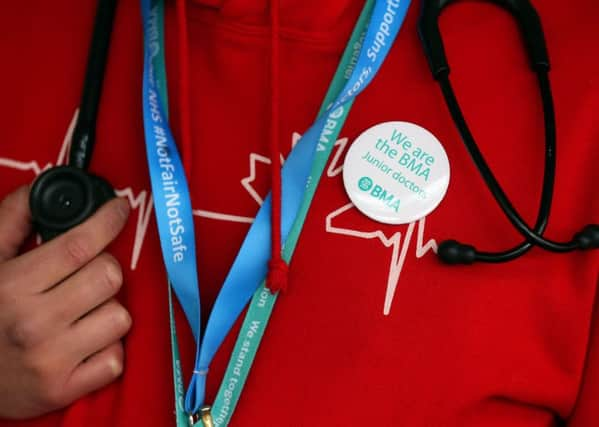Dying people '˜not getting enough to eat or drink in final days'


One in five people who saw their relative or friend die last year also felt decisions were taken about their care that the person would not have wanted.
Furthermore, hospital doctors and nurses showed less dignity and respect for loved ones than those working in other places, such as care homes and hospices.
Advertisement
Hide AdAdvertisement
Hide AdMore than 20,000 relatives and friends of people who died last year shared their views of end of life care for an Office for National Statistics (ONS) survey.
Of the deaths, 27% were from cardiovascular disease, 27% were from cancer and 46% were from other causes.
Overall, 69% of those whose loved one died in hospital rated the care as outstanding, excellent or good - significantly lower than the results for care homes (82%), hospices (79%) or care in the person’s own home (79%).
Asked if the person had adequate support to relieve thirst, hunger, pain and other problems, around three-quarters of relatives and friends agreed this was the case.
Advertisement
Hide AdAdvertisement
Hide AdBut one in eight (13%) disagreed or strongly disagreed that the patient’s need for food or nutrition was met in their last two days of life.
And 12% disagreed that there was adequate support for the patient to receive fluids while 12% disagreed other problems were looked after.
One in 10 people disagreed that pain relief was sufficient for their loved one in the last two days of life.
Hospital staff received the lowest ratings of always showing dignity and respect (60% for hospital doctors and 54% for hospital nurses) of all staff, although this has improved compared with previous surveys.
Advertisement
Hide AdAdvertisement
Hide AdFor individual conditions, cancer patients received less dignity and respect at all times (52%) from hospital nurses than those suffering heart disease (57%) or other causes (53%).
However, cancer patients received the most dignity and respect from district and community nurses, and in care homes and from hospice doctors and nurses.
For patients where pain had been an issue, 64% of relatives and friends felt it had been relieved “completely, all of the time” for those treated in hospices (64%) and least frequently for those who died at home (19%).
Almost one in 13 (8%) people cared for at home did not have their pain relieved at all, the survey found.
Advertisement
Hide AdAdvertisement
Hide AdMacmillan Cancer Support said the findings showed that relatives and friends felt one in 10 cancer patients had died without sufficient pain relief, 12% disagreed the person with cancer had support to eat or receive nutrition if he or she wanted and 11% had not received support to drink or receive fluid.
Dr Fran Woodard, executive director of policy and impact at Macmillan Cancer Support, said the findings made “for very sobering reading”.
She added: “This survey shows really basic failings in how people with cancer are spending their final days - at least one in 10 people with cancer are being left hungry, thirsty or in pain.
“Shockingly, almost one in eight people with cancer are not given enough help with personal needs, such as washing or going to the toilet. Dying people and their families should never be left in such terrible distress in this day and age.
Advertisement
Hide AdAdvertisement
Hide Ad“Looking after someone at the end of life can be incredibly stressful and all-consuming for families and carers. No family should be left alone to care for someone at the end of life without the right advice and support.
“Most people dying of cancer would prefer to be at home, but too often badly needed help is simply unavailable, and people have to go to hospital against their wishes.”
Simon Chapman, director of policy and external affairs for the National Council for Palliative Care, said: “There is a lot to learn from this data, but one thing that leaps out is that very little is changing.
“What’s good remains good, and what’s poor remains poor. We need to see improvements in the areas that are lagging.”
Advertisement
Hide AdAdvertisement
Hide AdDr Ros Taylor, clinical director at Hospice UK, said: “We urge the NHS to harness the expertise of hospices, especially on pain relief, good communication and support for families, so that high quality care is available to people at the end of life across all settings.”
Scott Sinclair, head of policy and public affairs at Marie Curie, said it was vital variations in care were addressed “so that people have the highest quality of care wherever they are when they die”.
He added: “This is why we need an urgent response from the Government to the Independent Review on Choice in End of Life Care, which was published over a year ago. Only through improving funding to palliative care services can the Government ensure high quality pain relief for people who choose to die at home, and better access to specialist palliative care in hospital.”
Dr Ros Taylor, clinical director at Hospice UK, said: “We urge the NHS to harness the expertise of hospices, especially on pain relief, good communication and support for families, so that high quality care is available to people at the end of life across all settings.”
Advertisement
Hide AdAdvertisement
Hide AdScott Sinclair, head of policy and public affairs at Marie Curie, said it was vital variations in care were addressed “so that people have the highest quality of care wherever they are when they die”.
He added: “This is why we need an urgent response from the Government to the Independent Review on Choice in End of Life Care, which was published over a year ago. Only through improving funding to palliative care services can the Government ensure high quality pain relief for people who choose to die at home, and better access to specialist palliative care in hospital.”